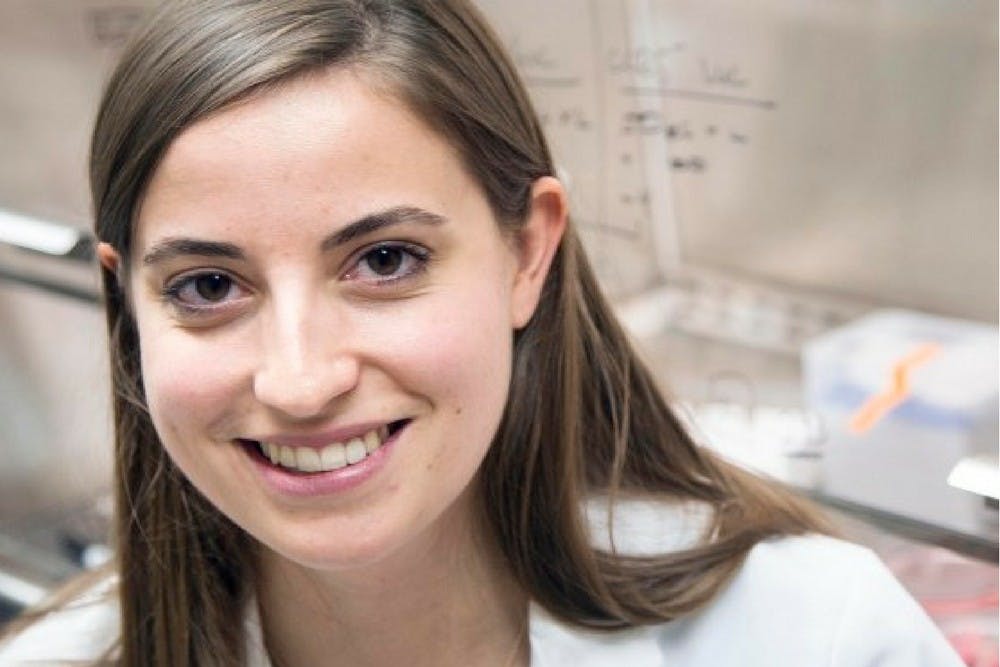Glioblastoma is among the most stubborn forms of brain cancer, with patients having a median survival time of just under 15 months. Because of a new treatment tested by Duke scientists, however, chances of survival may soon improve.
In a study published by Nature, a group of Duke researchers have developed a new treatment for glioblastomas, which represent almost one in five of all primary brain tumors. The researchers organized a trial that administered a dendritic cell vaccine with high doses of a chemotherapy drug known as temozolomide. Among the 11 patients in the study, the median survival time was 41.1 months—a staggering increase from 14.6 months for patients given the standard treatment.
"[There were] striking immune responses to the study regimen and very striking survival times for patients with this type of tumor," said lead author Kristen Batich, a graduate in the medical scientist training program.
She noted that the median progression-free time—the amount of time it takes, on average, for the tumor to begin growing again after treatment—lengthened to 25.3 months instead of the typical eight months observed in patients given the standard treatment. Batich also noted that four of the 11 patients were long-term survivors "without any signs of tumor progression at the time of analysis."
She explained that the idea behind the novel treatment was to retrain the immune system to selectively target proteins within the tumor itself.
“It’s an opportune moment to introduce your specific vaccine that you’re looking to train the immune system on, because essentially, the host is void of other competing immune cells,” Batich said. “It gives your immune system a signal to go fight that specific target—put all hands on deck—to go off and fight whatever you’ve introduced into the immune system.”
The vaccine given to the glioblastoma patients targeted a cytomegalovirus protein often present in the tumor itself but absent in other brain regions. Another distinction in the treatment was the intense dose regimen of the vaccine—instead of receiving the chemotherapy for five consecutive days, patients were given the drug for 21 straight days.
Batich explained that this experimental treatment also differed in several ways from the typical standard of care for newly diagnosed glioblastoma patients, which is already "pretty aggressive."
Following the diagnosis, doctors typically attempt surgery to remove as much of the glioblastoma tumor as possible, she noted. The patient is then subjected to a six-week course of chemotherapy with daily temozolomide and concurrent radiation therapy. After this, the chemotherapy is reduced slightly to monthly cycles until the tumor rebounds and the patient passes away.
“Even with this very aggressive radiation and concurrent chemotherapy regimen, 50 percent of the patients do have a median survival time of about 14.6 months,” Batich said.
Another hope for glioblastoma
The University is also home to the Glioblastoma Drug Discovery Group headed by Madan Kwatra, associate professor of pharmacology and cancer biology.
The group recently entered a three-year collaboration with DelMar Pharmaceuticals to conduct pre-clinical studies on a compound known as VAL-083.
“This is a drug that is a chemotherapeutic agent, and it’s very interesting because it works on all types of glioblastoma tumors,” Kwatra said.
Kwatra explained that temozolomide is effective in only 40 percent of glioblastoma patients—those who have a specific marking on a piece of DNA known as the MGMT promoter. However, VAL-083 is more versatile than the standard treatment because it affects all types of glioblastoma tumors.
“Glioblastoma is a very heterogeneous tumor, and in the past, people have been testing one drug on all of them, so it doesn’t work,” Kwatra said. “You have to find out which patient would respond to the drug that you’re testing because not everybody is going to respond.”
Get The Chronicle straight to your inbox
Sign up for our weekly newsletter. Cancel at any time.
Kwatra added that he believes DelMar turned to Duke because his group is focused on glioblastoma, whereas other groups work on a variety of brain tumors.
He noted that the primary goals of the collaboration were to test the drug on 20 different models of glioblastoma and examine which types of patients respond best to the new treatment. Doctors may then be able to better apply the concept of personalized medicine to glioblastoma.
Looking to the future
Batich said she also intends to improve the dendritic cell vaccine and dose-intensified chemotherapy regimen tested in the initial trial.
She explained that the initial study did not have a randomized comparison group, so another trial is being developed that will include patients not treated with the increased temozolomide doses. Additionally, researchers hope to determine the optimal time to inject the vaccine during the chemotherapy treatment, as altering the timing even slightly may have exaggerated effects.
“It’s a dismal and devastating disease,” Batich said. “There’s a great need for more specific, safer and more potent therapies that could stand to benefit for patients with this type of tumor.”

